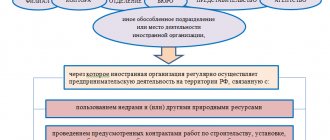VAT taxation of insurance transactions
In law enforcement practice, insurance organizations often have questions about the legality of exemption from value added tax for the services they provide. Let's consider these problems in detail.
Based on subparagraph 1 of paragraph 1 of Article 146 of the Tax Code of the Russian Federation, the object of VAT taxation is the sale of goods (work, services) on the territory of the Russian Federation, including the sale of pledged items and the transfer of goods (results of work performed, provision of services) under an agreement on the provision of compensation or novation , as well as transfer of property rights.
For the purposes of Chapter 21 of the Tax Code of the Russian Federation, the transfer of ownership of goods, the results of work performed, the provision of services free of charge is recognized as the sale of goods (work, services); The list of transactions not subject to VAT is established in Article 149 of the Tax Code of the Russian Federation.
Based on subparagraph 7 of paragraph 3 of Article 149 of the Tax Code of the Russian Federation, the provision of insurance, coinsurance and reinsurance services by insurance organizations, as well as the provision of services for non-state pension provision by non-state pension funds are not subject to taxation.
For the purposes of Article 149 of the Tax Code of the Russian Federation, insurance, co-insurance and reinsurance operations are recognized as operations as a result of which the insurance organization receives:
- insurance payments (remunerations) under insurance, co-insurance and reinsurance contracts, including insurance premiums, paid reinsurance commission (including bonus);
- interest accrued on depot premiums under reinsurance agreements and transferred by the reinsurer to the reinsurer;
- insurance premiums received by an authorized insurance organization that has concluded a co-insurance agreement in the prescribed manner on behalf of and on behalf of the insurers;
- funds received by the insurer by way of subrogation from the person responsible for the damage caused to the policyholder, in the amount of the insurance compensation paid to the policyholder.
Based on paragraph 1 of Article 2 of the Law of November 27, 1992.
N 4015-1 “On the organization of insurance business in the Russian Federation” (hereinafter referred to as Law N 4015-1), insurance recognizes relations to protect the interests of individuals and legal entities, the Russian Federation, constituent entities of the Russian Federation and municipalities in the event of certain insured events at the expense of monetary funds formed by insurers from paid insurance premiums (insurance contributions), as well as from other funds of insurers. Insurance activity (insurance business) is the field of activity of insurers in insurance, reinsurance, mutual insurance, as well as insurance brokers, insurance actuaries in the provision of services related to insurance and reinsurance. Article 927 of the Civil Code of the Russian Federation provides that insurance is carried out on the basis of property or personal insurance contracts concluded by a citizen or legal entity (policyholder) with an insurance organization (insurer).
In accordance with paragraph 1 of Article 829 of the Civil Code of the Russian Federation, under a property insurance contract, one party (the insurer) undertakes to compensate the other party (the policyholder) or another person in whose favor the an agreement has been concluded (to the beneficiary), losses caused as a result of this event in the insured property or losses in connection with other property interests of the insured (pay insurance compensation) within the limits of the amount specified in the agreement (insurance amount).
Property insurance has 3 types:
- Insurance of own property (Article 930 of the Civil Code of the Russian Federation)
- Civil liability insurance (Articles 931 and 932 of the Civil Code of the Russian Federation)
- Business risk insurance (Article 933 of the Civil Code of the Russian Federation)
Reinsurance
In accordance with paragraph 1 of Article 967 of the Civil Code of the Russian Federation, the risk of payment of insurance compensation or the insured amount assumed by the insurer under an insurance contract may be insured by it in full or in part with another insurer (insurers) under a reinsurance contract concluded with the latter.
Based on paragraph 2 of Article 967 of the Civil Code of the Russian Federation, the rules provided for in Chapter 48 of the Civil Code of the Russian Federation regarding business risk insurance are applied to the reinsurance agreement, unless otherwise provided by the reinsurance agreement. In this case, the insurer under the insurance contract (main contract), who has concluded a reinsurance contract, is considered to be the policyholder in this latter contract.
At the moment, in practice there are different schemes for the relationship between the reinsurer and the reinsurer in this case. First of all, they depend on the types and forms of reinsurance contracts concluded.
Under proportional reinsurance agreements, the cedant and the reinsurer usually divide the amount of subrogation (regression) in proportion to their participation in the insurance compensation.
Under non-proportional reinsurance agreements, amounts received by way of subrogation (regression) are mainly included in the loss (unprofitability) account in the final settlements between the reinsurer and the reinsurer. If the implementation of the claim for subrogation (recourse) occurred after the final settlement between the parties and if the contract provides that the funds received from the implementation of these claims reduce the amount of loss under the original insurance contract, then the reinsurer who made the payment within the higher excesses has priority on receiving funds before those who made payments within lower excesses.
In connection with the above, funds received by the insurer-reinsurer by way of subrogation from the person responsible for the damage caused to the policyholder, in the amount of the insurance compensation paid by this insurer to the policyholder, are not subject to value added tax.
If the risk of payment of insurance compensation of the insurer is partially insured by the reinsurer, then the funds received by this reinsurer in the share of the insurance compensation paid by it to the insurer-reinsurer are not subject to value added tax. The validity of such conclusions is also confirmed in the Letter of the Federal Tax Service of Russia dated August 10, 2005 N 03-1-03/1372/10.
Free transfer of insurance policies
Article 940 of the Civil Code of the Russian Federation stipulates that the insurance contract must be concluded in writing. In this case, the insurance contract can be concluded by drawing up one document or by delivering the insurer to the policyholder on the basis of his written or oral application of the insurance policy (certificate, certificate, receipt) signed by the insurer. When concluding an insurance contract, the insurer has the right to use standard forms of agreement (insurance policy) developed by it or an association of insurers for certain types of insurance.
In connection with the above, the gratuitous transfer of insurance policies by an insurance organization during an advertising campaign is not subject to value added tax. This is indicated by the Ministry of Finance of Russia in Letter dated August 15, 2005 N 03-04-05/13.
Insurance premiums
The Moscow Department of the Ministry of Taxes and Taxes of Russia in Letter dated 04/08/2003 N 24-11/18938 explained that when providing services for the collection of insurance premiums on the basis of intermediary agreements, the amount of insurance premiums transferred by the attorney (agent) of the insurance company to the tax base for the tax the added value of the attorney (agent) is not included. In this case, an attorney (agent) who is not an insurance organization, when providing agency services to an insurance organization, becomes obligated to pay value added tax on commission fees.
Cargo insurance
In judicial practice, there are disputes regarding the legality of extending the above provisions in relation to operations under a cargo insurance contract.
Local tax authorities believe that cargo insurance services are subject to taxation on the basis of paragraph 7 of Article 149 of the Tax Code of the Russian Federation.
According to the courts, the provision of services for organizing cargo insurance refers to operations subject to taxation under value added tax (see, for example, the Decision of the Moscow Arbitration Court dated 10.10.2005, 14.10.2005 N A40-37404/05-76- 312, Resolution of the Federal Antimonopoly Service of the Moscow District dated August 24, 2006 N KA-A40/6900-06 left unchanged). At the same time, the taxpayer providing such services, in order to apply the exemption from value added tax, must have an appropriate license.
Example.
The crux of the matter.By the decision of the tax authority, the taxpayer was held liable for taxation on the basis of paragraph 1 of Article 122 of the Tax Code of the Russian Federation for failure to pay value added tax in the form of a fine, and he was also charged the amount of tax and corresponding penalties for payment to the budget.
The basis for this decision was the findings of the tax authority on the sale by the taxpayer of cargo insurance services during the audited periods. According to the tax authority, the sale of these services was subject to taxation on the basis of paragraph 7 of Article 149 of the Tax Code of the Russian Federation.
Considering that the decision of the tax authority contradicted the norms of tax legislation and violated his rights and legitimate interests, the taxpayer applied to the arbitration court to declare the decision invalid.
The court's position.
As follows from the case materials, a cargo insurance agreement was concluded between the taxpayer (the policyholder) and the counterparty (the insurer). According to this agreement, the insurer issued insurance policies to the insured for each railway shipment, which indicated the insured amount and the amount of the insurance tariff. The additional agreement to the said cargo insurance contract stipulates that the policyholder has the right to insure the shipped products on behalf of its buyers (customers).
Subclause 1 of clause 1 of Article 146 of the Tax Code of the Russian Federation establishes that operations involving the sale of goods (work, services) on the territory of the Russian Federation are recognized as an object of VAT taxation.
By virtue of Article 39 of the Tax Code of the Russian Federation, the sale of goods, work or services by an organization or an individual entrepreneur is recognized, respectively, as the transfer on a compensated basis of ownership of goods, the results of work performed by one person for another person, the provision of services for a fee by one person to another person, and in cases provided for by the Tax Code RF, transfer of ownership of goods, results of work performed by one person for another person, provision of services by one person to another person - free of charge.
From the analysis of the evidence presented in the case materials, taking into account the provisions of Articles 65, 71 of the Arbitration Procedure Code of the Russian Federation, it follows that the taxpayer in the case under consideration did not carry out transactions that, according to subparagraph 7 of paragraph 3 of Article 149 of the Tax Code of the Russian Federation, are recognized as insurance services.
In accordance with the terms of the supply agreement, ownership of the goods passes from the moment it is transferred to the carrier.
From the study of the set of conditions under the insurance contract and the supply contract, it follows that the insurance contract was actually concluded by the taxpayer with the insurer in the interests of the buyer and did not provide for remuneration, which does not contradict Article 939 of the Civil Code of the Russian Federation.
The case materials do not contain evidence of the taxpayer’s abuse of his rights and artificially lowering the price of products for disputed payments.
Under such circumstances, the tax authority has not proven the taxpayer’s concealment of the subject of VAT on the amounts received by him in reimbursement of expenses for the payment of insurance tariffs to the insurance organization.
(based on the materials of the Resolution of the Federal Antimonopoly Service of the Ural District dated 04/08/2008 N F09-2121/08-S2).
In the considered Resolution, the court considered that the taxpayer, in relations related to the insurance of products of buyers (customers), is not an insurance organization, since the relevant agreement was concluded by him as an insured.
It should be noted that in the situation discussed in the commented Resolution, the taxpayer did not have a license to carry out insurance activities. Obviously, in such a situation, the insurance organization for the purposes of applying subparagraph 7 of paragraph 3 of Article 149 of the Tax Code of the Russian Federation will be an insurer that has the appropriate license.
Hello Guest! Offer from "Clerk"
Online professional retraining “Chief accountant on the simplified tax system” with a diploma for 250 academic hours . Learn everything new to avoid mistakes. Online training for 2 months, the stream starts on March 1.
Sign up
Should I pay VAT when forming an insurance fund?
There is no provision for an insurance fund in the contract. The formation of the insurance fund appears only in the consolidated estimate; on the basis of the consolidated estimate, a protocol of a firm contract price and, accordingly, KS-2 was signed with the Customer. The insurance fund is laid down in Chapter 9 of the consolidated estimate “Other work and costs.” When drawing up the contract value (statement), the insurance amount was distributed proportionally among the enlarged types of work in accordance with clause 2.2.2 of the additional agreement No. 48 dated December 27, 2016 to contract No. 1. That is, for all items of the construction and installation work statement, which is an integral part of the additional agreement, the insurance amount has been distributed. What tax risk does the Company face regarding the payment of VAT and profit?
The party charged with insurance must provide the other party with evidence that it has concluded an insurance contract on the terms and conditions provided for in the construction contract, including information about the insurer, the amount of the insured amount and the insured risks. If the specified evidence is not provided within the agreed time frame, the customer has the right to demand termination of the agreement (contract).
Payment of an insurance premium by a construction organization is accounted for as an advance payment for services (advances for services). This prepayment is recognized as an expense to the organization as the insurance period expires. It is reflected in account 76 “Settlements with various debtors and creditors” subaccount “Settlements for property and personal insurance”. The transferred amount of insurance payments is debited to account 76 in correspondence with the cash accounts. Insurance costs in construction for a specific construction project should be included in direct costs under the contract in equal shares, determined based on the validity period of the insurance contract, and debited to account 20 “Main production” in correspondence with account 76 subaccount “Calculations for property and personal insurance "
An insurance contract can be concluded to insure construction risks of several accounting objects, the work on which is carried out within the framework of one construction contract. Then the distribution of insurance costs between accounting objects is made in proportion to the contractual (estimated) cost of work for each accounting object or on another economically justified basis. In this case, initially insurance premiums can be written off to the debit of account 25 “General production expenses” with subsequent distribution and closure to the corresponding analytical sub-account to account 20.
Tax accounting of insurance costs in construction
In accordance with subparagraph 4 of paragraph 1 of Article 263 of the Tax Code of the Russian Federation, expenses for property insurance taken into account when calculating income tax include insurance premiums for voluntary insurance of risks associated with construction and installation work. At the same time, according to the judges of the Federal Antimonopoly Service of the Moscow District (see resolution No. A40-96349/11-116-269 of May 29, 2012), tax legislation does not limit the taxpayer’s right to take into account the costs of insuring construction and installation risks by carrying out activities as a contractor construction organization, since both the contractor and the customer can be insurers of these risks. If risk insurance is carried out by a contracting organization, it has the right to take into account the costs of voluntary insurance of construction risks for profit tax purposes as part of other expenses in the amount of actual costs in the manner established by paragraph 6 of Article 272 of the Tax Code of the Russian Federation.
Thus, if the terms of the insurance contract provide for payment of the insurance premium in a one-time payment, then under contracts concluded for more than one reporting period, expenses are recognized evenly over the term of the contract in proportion to the number of calendar days of the contract in the reporting period. According to subparagraph 7 of paragraph 3 of Article 149 of the Tax Code of the Russian Federation, the provision of insurance services is not subject to VAT. But the tax base for value added tax in relation to contract construction work performed by an organization, the price of which is formed taking into account the costs of this organization for voluntary insurance, is determined as the contract price of these works. Moreover, tax is not calculated on individual components of the contract price.
This is indicated in letters of the Ministry of Finance of Russia dated March 25, 2013 No. 03-07-11/9360, dated March 1, 2013 No. 03-07-11/6089. Accordingly, the customer has the right to deduct VAT presented by the contractor in invoices for construction and installation work performed, in the manner established by Article 172 of the Tax Code of the Russian Federation (see letter of the Ministry of Finance of Russia dated June 6, 2013 No. ED-4-3/ [ email protected] ).
Forms KS-2, KS-3 signed by all parties are an independent transaction (action aimed at creating, changing, terminating legal relations). Therefore, there are no tax risks due to the fact that the insurance fund is included in the contract price.




